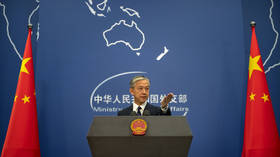The US spied on its key allies. Will they finally resist?

US President Joe Biden’s administration is in a serious bind after officials were made aware last week that a cache of secret documents was leaked in March showing the US spied on allies.
One of the most damning leaks revealed extensive details of US military support in Ukraine and the exact location of troops, supply specifications and other information related to Kiev’s upcoming spring offensive against Russia. But another important leak surfaced too.
Korean media reported that the CIA files revealed that the US appears to have been spying on the South Korean National Security Office (NSO) in Seoul. The NSO is described as the “control tower of South Korea’s security decision-making.” Additionally, the leaked reports show that the US has also been spying on the UK, Canada and Israel.
The Korean details are the most serious allegations because they involve outright wiretapping. The documents show that South Korean government officials were put in a “difficult position” over sending lethal aid to Ukraine because it might be seen by the public as a “quid pro quo for a state visit.” That state visit by South Korean President Yoon Suk-yeol is slated for April 26.
The South Korean leader now has to deal with the prospect of visiting his close allies in Washington while knowing they most probably conducted illegal wiretapping against his country, upsetting Seoul’s national interests and threatening the country’s sovereignty. The documents have for the most part been recognized as legitimate, notwithstanding a few manipulations of casualty figures, and the reaction from Washington obviously suggests they are real.
Thus, the US is in a sticky situation. It is clearly no coincidence that all of the countries joining Washington’s proxy war in Ukraine, sending arms, and joining sanctions against Russia are under the US nuclear umbrella and have US troops stationed within their borders. That alone suggests that the national governments of these countries are under significant strategic pressure to join Washington’s crusade.
However, illegal spying is another thing. It’s such a brazen violation of national sovereignty that no leader can afford to accept this without suffering domestic political ramifications. In order to repair the public opinion damage and survive future elections, the victims of “allied” spying might have to walk back their level of support for the US as a response to the surveillance campaign.
This is why some have called the revelations the most damaging since former NSA contractor Edward Snowden exposed the global US spying campaign through bulk data collection and who then faced a witchhunt from Washington, only to find refuge in Russia. Federal officials have since apparently found the culprit of these leaks, a 21-year-old member of the Massachusetts Air National Guard’s intelligence wing identified by the New York Times as Jack Teixeira.
The damage is probably already done. April 26th could see the first domino fall if President Yoon is pressed to walk back his support of Washington’s strategic posturing vis-a-vis Ukraine due to domestic backlash. But it would probably not be the last as friend and foe alike point to America’s lack of good faith in dealing with partners, resorting to espionage instead of negotiation.
This is, of course, not the first time the US has been accused of spying on its allies. A 2015 investigation revealed that the US spied on key European allies through Danish channels, widely reported in May 2021. It was confirmed that, at least from 2012 to 2014, the US spied on senior officials in France, Norway, Sweden and Germany, including former Chancellor Angela Merkel, former Foreign Minister Frank-Walter Steinmeier and others.
It’s not likely a coincidence that key US partners are now saying they want to avoid being mere lackeys to Washington’s global empire. For example, French President Emmanuel Macron told Politico, following his recent visit to China, that Europe must resist pressure to become “America’s followers.” Soon after, European Council chief Charles Michel said European leaders are warming up to the French president’s idea.
For the US to maintain a global security framework and station troops in their allied countries is one thing. It may be seen by some as military occupation of the given country – however, there are arguably some benefits to this. By allowing countries like Japan, South Korea and others to outsource their security needs and associated costs to the US, they can focus more on their economic development. This was, in fact, a major reason why the demilitarization of Japan was acceptable for Tokyo. This is also why the pro-Trump sector of the US is against the current security arrangement with key allies.
That being said, illegal espionage at the highest levels is completely unacceptable and raises serious red flags about whether the current security arrangement of the US and its “allies” is fair or legitimate. These latest leaks could lead to a drastic change in the current status quo or else voters in these countries may well demand it. The upcoming meeting between Yoon and Biden could be the first in a long chain of painful strategic losses for Washington.
The statements, views and opinions expressed in this column are solely those of the author and do not necessarily represent those of RT.















